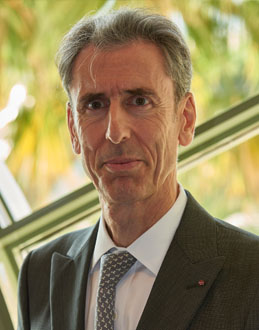From 2011 to 2015, Gilles Tonelli held the post of Ambassador of Monaco to Belgium, the Netherlands and Luxembourg. During this period he was also a Head of Mission with the European Union – a certain asset for the new Minister for Foreign Affairs and Cooperation.
What are the major cases Foreign Affairs deals with?
They primarily concern the directions HSH the Sovereign Prince has defined and that are in part a function of his commitments and in part the result of current events; thus it may be said today that the two main topics relate respectively to COP 21 in Paris and the negotiations with the European Union.
Major international news topics, such as the difficult question of refugees, are also part of our current important concerns. Then we treat in general the implementation of our policy of active neutrality both within international fora and in bilateral matters, and of course we deal with our multilateral positions bringing the voice of Monaco.
Can we take stock of the negotiations with the European Union?
They are underway and will take two to three years. It is a question of opening up the market for Monegasque companies to the maximum. But also of respecting the particularities of our market: Monaco, a city-state, must preserve its national identity and the dynamism of its business model. It is necessary to increase trade with business players, to better understand their concerns and defend their specificities effectively. Franck Biancheri has been entrusted with this interface mission with the private sector. The Economic and Social Council, FEDEM (Association of Monegasque Companies), AMAF (Monegasque Association of Financial Activities) and even the regulated professions committee are also consulted regularly.
Your Ministry also deals with international cooperation. How is Monegasque cooperation structured?
Monegasque cooperation has a specific Department within the Ministry, led effectively by Mrs. Bénédicte Schultz. It has twelve people and is structured to deal with bilateral, multilateral and cross-disciplinary programmes and those related to civil protection and emergencies.
This Department develops and proposes three-year cooperation plans with the directions chosen by HSH the Sovereign Prince, and its mission is then to deal with the proper implementation of the selected projects. It is also responsible for providing assistance in emergencies.
Cooperation has the support of local technical coordinators - 5 at present, in Tunisia, Mali, Madagascar, Burkina Faso and Niger.
The Department also has the support of the Monaco International Volunteers. Since the MIV were created in 2008 (21 to 35 years), over 35 have set out on a mission. 7 MIV are posted to date, mainly in Africa (5), Madagascar (1) and Mongolia (1).
What are the directions given to this cooperation?
The Prince’s choice for our cooperation action is to focus on a limited number of countries and be involved there in a regular, practical and pragmatic manner. Thus three focus areas are prioritised: health – education – socio-economic integration.
A dozen countries have been selected in 3 geographical areas: West Africa – Maghreb Mashreq – Eastern and Southern Africa, plus Mongolia.
There are five key programmes for each of these countries:
- the fight against sickle cell anaemia
- support for street children
- the fight against pandemics
- support for persons with disabilities
- support for civil protection programmes.
In addition to these principles, we strive to develop cooperation using the most effective methods. Thus we are currently developing support for certain initiatives in two complementary forms, one the one hand financial investment, and on the other assistance for technical means to be implemented for the success of the projects. Thus for SMEs in Africa.
This theme leads to the impending COP 21 in Paris: is cooperation implemented by Monaco linked with climate change issues?
Yes, cooperation should also take this dimension into account, from the moment that if nothing is done, the next people who will have to be helped will be climate refugees.
Indeed, many people may be displaced beyond their borders due to disasters such as rising sea levels or severe weather events resulting from this change.
Monaco has already made many efforts. As part of our participation in the first Kyoto Protocol period, compared with 1990 Monaco reduced its emissions by 13.2 % in 2012 and achieved its goal of an 8% average reduction over the 2008-2012 period. The Principality of Monaco now has the goal of reducing its greenhouse gas emissions by 50% by 2030.
Monaco is part of the "Friends of the Nansen Initiative Group (the first high commissioner for refugees and Arctic explorer)" which comes under the 17 sustainable development goals, COP 21 and disaster risk prevention. Launched in October 2012 by Switzerland and Norway, this Initiative now brings together many countries.
A repository of good practice has already been established and has recommendation value without being binding.
Thus, Monaco is involved in the Nansen Initiative, that aims to help these refugees in the future and has the goal of better preparing for these changes.






